Amos 4 meaning explained in AI Summary
This chapter continues God's pronouncements of judgment against Israel, specifically focusing on their stubborn refusal to repent despite repeated warnings and punishments.
1. Indictment of the Oppressors (4:1-3):
- Amos addresses the wealthy, powerful women of Samaria (the capital of Israel), comparing them to well-fed cows.
- He accuses them of exploiting the poor and vulnerable, living in luxury while others suffer.
- God declares that He will punish them for their cruelty and injustice, sending them into exile.
2. Recalling Past Punishments (4:4-11):
- God reminds Israel of the various ways He has already disciplined them for their sins:
- Famine (4:6): He withheld rain and caused crops to fail.
- Drought (4:7-8): He dried up their water sources.
- Blight and Pestilence (4:9): He sent diseases to destroy their crops and livestock.
- War and Destruction (4:10): He allowed their enemies to defeat them in battle.
- Plague (4:10): He sent a plague among them, similar to the one in Egypt.
- Stench (4:10): He caused a foul odor to permeate their camps.
- Despite all these calamities, Israel still refused to return to God.
3. Warning of Impending Doom (4:12-13):
- God warns that He is preparing an even greater punishment, one they will not be able to escape.
- He describes Himself as the Creator of all things, emphasizing His power and sovereignty.
Key Themes:
- God's Justice: God is just and will not tolerate sin indefinitely. He punishes wickedness, even among His chosen people.
- The Futility of Ignoring God: Ignoring God's warnings and discipline only leads to greater judgment.
- The Need for Repentance: God desires repentance more than punishment. He longs for His people to turn back to Him.
Overall Message:
Chapter 4 serves as a stark reminder that God's patience has limits. He is merciful and long-suffering, but He will not allow sin to go unpunished forever. The chapter is a call to repentance, urging Israel to turn back to God before it's too late.
Amos 4 bible study ai commentary
The overarching theme of Amos 4 is the utter failure of God's corrective discipline to bring a stubborn and prosperous Israel to repentance. The chapter methodically details Israel's sins of social injustice and hypocritical religion, lists a series of escalating divine judgments that were ignored, and climaxes with an ultimate, terrifying summons for the unrepentant nation to face its all-powerful God.
Amos 4 Context
Amos prophesied during the reign of Jeroboam II (c. 782-753 BC) over the Northern Kingdom of Israel. This was a period of great peace, territorial expansion, and immense wealth. However, this prosperity led to systemic social decay, where the rich elites oppressed the poor and vulnerable. Religious observance was prevalent at official shrines like Bethel and Gilgal, but it was corrupted by syncretism and divorced from justice and righteousness, rendering it meaningless to God.
Amos 4:1-3
Hear this word, you cows of Bashan, who are on the mountain of Samaria, who oppress the poor, who crush the needy, who say to your husbands, “Bring, that we may drink!” The Lord GOD has sworn by his holiness that, behold, the days are coming upon you, when he will take you away with hooks, even the last of you with fishhooks. And you shall go out through the breaches, each one straight ahead; and you shall be cast into Harmon,” declares the LORD.
In-depth-analysis
- "Cows of Bashan": A deeply insulting metaphor. Bashan (modern Golan Heights) was famous for its lush pastures and strong, fat cattle. Amos uses this term for the wealthy, self-indulgent women of Samaria's elite. It highlights their laziness, opulence, and lack of humanity.
- Their Sin: They actively drive social injustice by demanding luxuries ("Bring, that we may drink!"), which their husbands acquire by oppressing the poor. They are not passive beneficiaries but active agents of corruption.
- "Sworn by his holiness": This is God's most solemn oath. His very nature (perfect, just, and separate from sin) is the guarantee of this judgment. His character cannot tolerate this injustice.
- "Hooks" and "Fishhooks": This is a graphic prophecy of the Assyrian exile. The Assyrians were notorious for their brutality, including leading captives by hooks pierced through their lips or noses, treating them like animals. This punishment directly mirrors their cattle-like behavior.
- "Breaches": The walls of Samaria will be broken down, leaving no escape. The image of each person going "straight ahead" depicts a total, systematic deportation.
- "Harmon": The meaning of this Hebrew word is uncertain. Scholars suggest it could mean a dunghill, a fortress, or a specific, desolate place of exile, but the consensus is that it signifies a place of dishonor and ruin.
Bible references
- Isaiah 3:16-17: "The LORD says: The women of Zion are haughty... the Lord will smite with a scab the heads of the women of Zion..." (Judgment on wealthy, proud women).
- Ezekiel 16:49: "Behold, this was the guilt of your sister Sodom: she and her daughters had pride, excess of food, and prosperous ease, but did not aid the poor and needy." (Parallels pride and luxury with neglect of the poor).
- 2 Kings 17:6: "In the ninth year of Hoshea, the king of Assyria captured Samaria, and he carried the Israelites away to Assyria..." (The historical fulfillment of this prophecy).
Cross references
Jer 16:16 (sent for fishers); Hab 1:14-15 (cruel capture); Deut 32:15 (Jeshurun grew fat); Prov 21:13 (ignoring the poor).
Amos 4:4-5
“Come to Bethel, and transgress; to Gilgal, and multiply transgression; bring your sacrifices every morning, your tithes every three days; offer a sacrifice of thanksgiving of that which is leavened, and proclaim freewill offerings, publish them; for so you love to do, O people of Israel!” declares the Lord GOD.
In-depth-analysis
- Sarcastic Invitation: God uses biting sarcasm, commanding them to "come and sin" at their most holy sites. Bethel and Gilgal, historically significant places of worship, had become centers of syncretic, state-sponsored religion established by Jeroboam I.
- Multiply Transgression: Their religious activities are not just empty; they actively compound their sin because they are performed with unrepentant hearts full of injustice. God is essentially saying, "The more you worship, the more you sin."
- Extravagant Religion: "Sacrifices every morning, tithes every three days" describes a hyper-pious, even excessive, observance of religious ritual that goes beyond the law's requirements.
- "Leavened" Thanksgiving: Offering leaven with a thanksgiving sacrifice was permissible (Lev 7:13), but in this context, coupled with the command to "publish" it, the emphasis is on their public show of piety. Leaven often symbolizes corruption, making it a subtle jab at their sincerity.
- "For so you love to do": This is the heart of the issue. They love the feeling and appearance of being religious, but they do not love God or their neighbor. Their religion serves their own pride.
Bible references
- Isaiah 1:11-13: "'What to me is the multitude of your sacrifices?' says the LORD... 'Bring no more vain offerings; incense is an abomination to me...'" (God rejecting worship disconnected from justice).
- Hosea 4:15: "...do not go up to Gilgal, and do not go up to Beth-aven..." (Beth-aven "house of iniquity" was a pejorative name for Bethel, "house of God").
- Micah 6:8: "He has told you, O man, what is good; and what does the LORD require of you but to do justice, and to love kindness, and to walk humbly with your God?" (Defines true worship).
- Matthew 23:23: "Woe to you... You have neglected the more important matters of the law—justice, mercy, and faithfulness. You should have practiced the latter, without neglecting the former." (Jesus condemning the Pharisees' hypocrisy).
Cross references
1 Sam 15:22 (obedience over sacrifice); Prov 21:3 (justice over sacrifice); Mal 1:10 (shut the doors of the temple).
Polemics
This is a direct polemic against Israel's syncretic worship system. They likely believed their meticulous rituals were appeasing God and securing their prosperity. Amos shatters this illusion, declaring that the God of the covenant is a God of justice, and ritual without righteousness is offensive to Him.
Amos 4:6-11
“I gave you cleanness of teeth in all your cities... yet you did not return to me,” declares the LORD. (v.6)“I also withheld the rain from you... yet you did not return to me,” declares the LORD. (v.7)“I struck you with blight and mildew... your gardens and your vineyards, your fig trees and your olive trees the locust devoured; yet you did not return to me,” declares the LORD. (v.9)“I sent among you a pestilence after the manner of Egypt... yet you did not return to me,” declares the LORD. (v.10)“I overthrew some of you, as when God overthrew Sodom and Gomorrah... yet you did not return to me,” declares the LORD. (v.11)
In-depth-analysis
- Five Stanzas of Judgment: Amos structures this section as a list of five distinct, escalating calamities God sent to discipline Israel.
- Corrective Purpose: Each judgment was a form of "severe mercy" designed to break through their complacency and turn them back to God.
- Liturgical Refrain: The section is defined by the haunting refrain repeated five times: "welo-shavtem 'aday," meaning, "and you did not return to me." This refrain highlights Israel's stubbornness and the failure of God's disciplinary actions.
- Systematic De-creation: These curses systematically reverse the blessings of the covenant (cf. Deut 28). God takes away food, water, produce, health, and security.
- Famine (v. 6): "Cleanness of teeth" is a vivid idiom for having nothing to eat.
- Drought (v. 7-8): The drought was supernatural and targeted, making God's hand undeniable. One city gets rain, another does not.
- Agricultural Ruin (v. 9): Blight, mildew, and locusts directly attack the foundation of their agricultural economy.
- Plague and War (v. 10): "Pestilence after the manner of Egypt" is a direct reference to the Exodus plagues, showing that Israel is now being treated like God's enemies. The "stench of your camps" is a gruesome image of death and decay.
- Utter Destruction (v. 11): Comparing them to Sodom and Gomorrah—the archetypal example of divine judgment—is the ultimate warning. "A brand plucked from the burning" shows that God mercifully saved a remnant, yet even this great act of salvation did not produce repentance.
Bible references
- Deuteronomy 28:22, 38-40: "The LORD will strike you with wasting disease and with fever, inflammation and fiery heat... you shall carry much seed into the field and shall gather in little..." (Lists the precise covenant curses Amos mentions).
- Haggai 2:17: "'I struck you and all the products of your toil with blight and with mildew and with hail, yet you did not turn to me,' declares the LORD." (The same refrain used centuries later for the post-exilic community).
- Zechariah 3:2: "And the LORD said to Satan, 'The LORD rebuke you, O Satan! The LORD who has chosen Jerusalem rebuke you! Is not this a brand plucked from the fire?'" (Echoes the exact language for God's merciful restoration).
- Revelation 9:20-21: "The rest of mankind, who were not killed by these plagues, did not repent... Nor did they repent of their murders or their sorceries or their sexual immorality or their thefts." (Shows humanity's stubborn refusal to repent in the face of judgment).
Cross references
Lev 26:18-28 (covenant curses); Isa 9:13 (people do not turn); Jer 5:3 (refused correction); Joel 1-2 (locust plague as call to repent).
Amos 4:12-13
“Therefore thus I will do to you, O Israel; because I will do this to you, prepare to meet your God, O Israel!” For behold, he who forms the mountains and creates the wind, and declares to man what is his thought, who makes the morning darkness, and treads on the high places of the earth— the LORD, the God of hosts, is his name!
In-depth-analysis
- "Therefore thus...": The logic is inescapable. Because oppression continued, because worship was hypocritical, and because all corrective discipline has failed, therefore a final, unavoidable judgment is coming. The nature of this judgment is left ominously vague ("thus I will do to you"), making it even more terrifying.
- "Prepare to meet your God": This is not a comforting invitation. It is a terrifying summons. It carries the weight of a legal summons to face a judge or a military challenge to face an unconquerable warrior. All other interventions have failed; now Israel must face God directly.
- Doxology of a Terrifying God (v. 13): The chapter climaxes with a hymn (doxology) describing the awesome power of the God they are about to "meet." This isn't the familiar, comfortable God of their corrupted sanctuaries. This God is:
- The Sovereign Creator: He forms mountains and creates wind.
- The Omniscient Revealer: He knows and declares man's innermost thoughts, making deception impossible.
- The Master of Time and Nature: He "makes the morning darkness" (controls day and night, perhaps a reference to eclipses or the gloom of judgment).
- The Transcendent Ruler: He "treads on the high places of the earth," a symbol of absolute authority over every kingdom and deity.
- His Name: YHWH 'elohe tseva'ot (The LORD, the God of hosts/armies). This title emphasizes His supreme power and command over all heavenly and earthly forces. Israel is being summoned to face the Commander of the armies of heaven.
Bible references
- Exodus 19:10-11: "Go... consecrate them... and be ready for the third day. For on the third day the LORD will come down on Mount Sinai in the sight of all the people." (A summons to meet God, but for covenant-making, not judgment).
- Nahum 1:3, 5: "The LORD is slow to anger and great in power... The mountains quake before him, and the hills melt away." (A similar description of God's awesome power in judgment).
- Psalm 139:2: "You know when I sit down and when I rise up; you discern my thoughts from afar." (Confirms God's omniscience).
- Revelation 6:16-17: "...calling to the mountains and rocks, 'Fall on us and hide us from the face of him who is seated on the throne, and from the wrath of the Lamb, for the great day of their wrath has come, and who can stand?'" (The ultimate "meeting God" in judgment).
Cross references
Mic 1:3-4 (God treads on high places); Isa 40:12 (God measures creation); Heb 4:12-13 (exposed before God); Dan 2:22 (reveals deep things).
Polemics
The description in verse 13 is a powerful polemic against Baal and other nature gods. The Canaanite god Baal was believed to control storms, fertility, and the mountains where he supposedly lived. Amos declares that YHWH is the one who truly forms the mountains, creates the wind, and treads upon all high places in absolute supremacy.
Amos Chapter 4 analysis
- A "Reverse Exodus": The five judgments in vv. 6-11 systematically mirror and reverse the blessings God gave Israel in the Exodus and conquest. Instead of manna, He gives famine. Instead of water from the rock, He gives drought. He sends plagues "like Egypt" upon them, recasting them in the role of the oppressors, not the redeemed.
- Failure of Grace: The chapter is a stunning portrayal of the hardening of the human heart. Each escalating judgment, from economic to existential, was an act of God's grace meant to provoke repentance. Israel's refusal at every stage ("yet you did not return to me") demonstrates a profound spiritual rebellion that makes the final judgment both necessary and just.
- Structure as Argument: The chapter is built like a legal case.
- Indictment (vv. 1-3): Specific charges against the elite.
- Dismissal of Defense (vv. 4-5): Their "religious observance" is thrown out as inadmissible hypocrisy.
- Evidence of Prior Warnings (vv. 6-11): A record of five ignored warnings is presented.
- Final Sentencing (v. 12): The final, unavoidable summons is issued.
- Authority of the Judge (v. 13): A final declaration of the Judge's absolute power and authority.
Amos 4 summary
Amos 4 is God's indictment against the Northern Kingdom of Israel. He condemns the social oppression driven by the wealthy elites and mocks their hypocritical religious shows. He recounts five escalating calamities—famine, drought, blight, plague, and destruction—which He sent as disciplinary warnings, each time noting Israel's stubborn refusal to repent. Having exhausted all other means, the chapter culminates in a terrifying command for Israel to prepare for a direct and final encounter with their awesome and all-powerful Creator-Judge.
Amos 4 AI Image Audio and Video

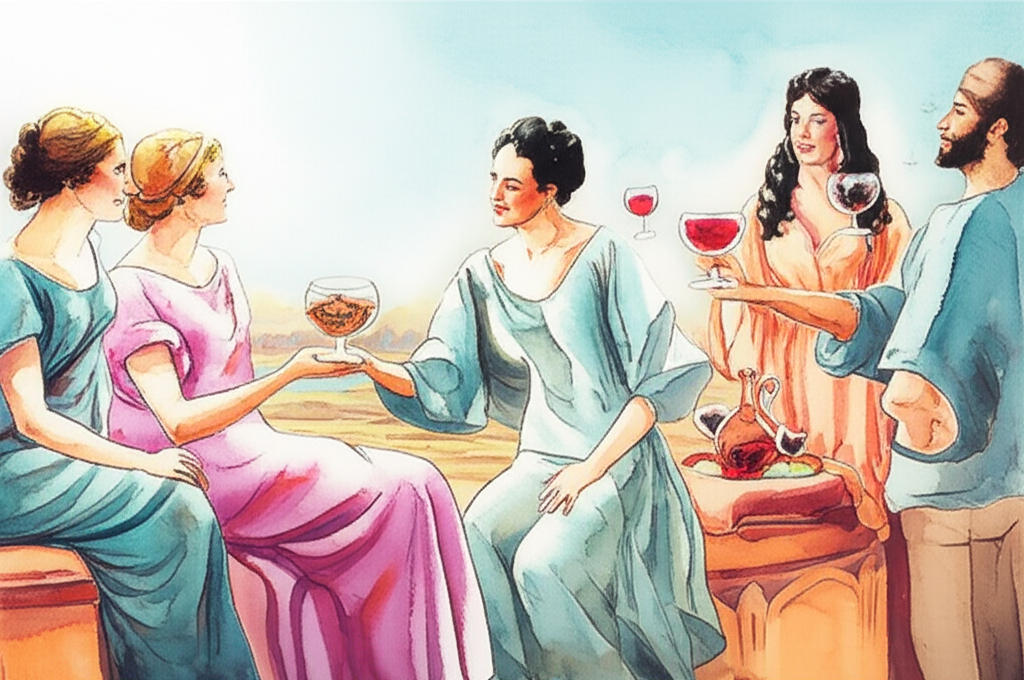
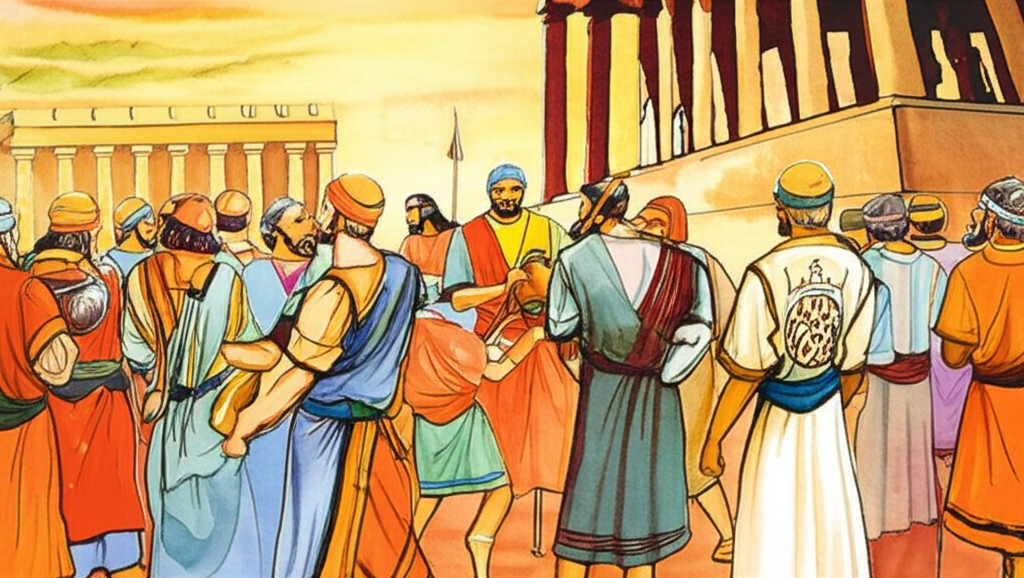
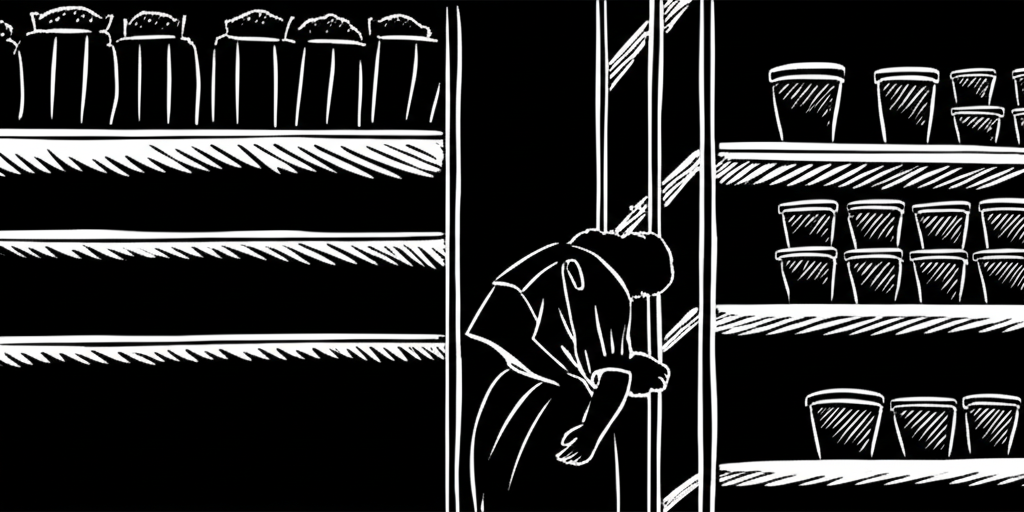
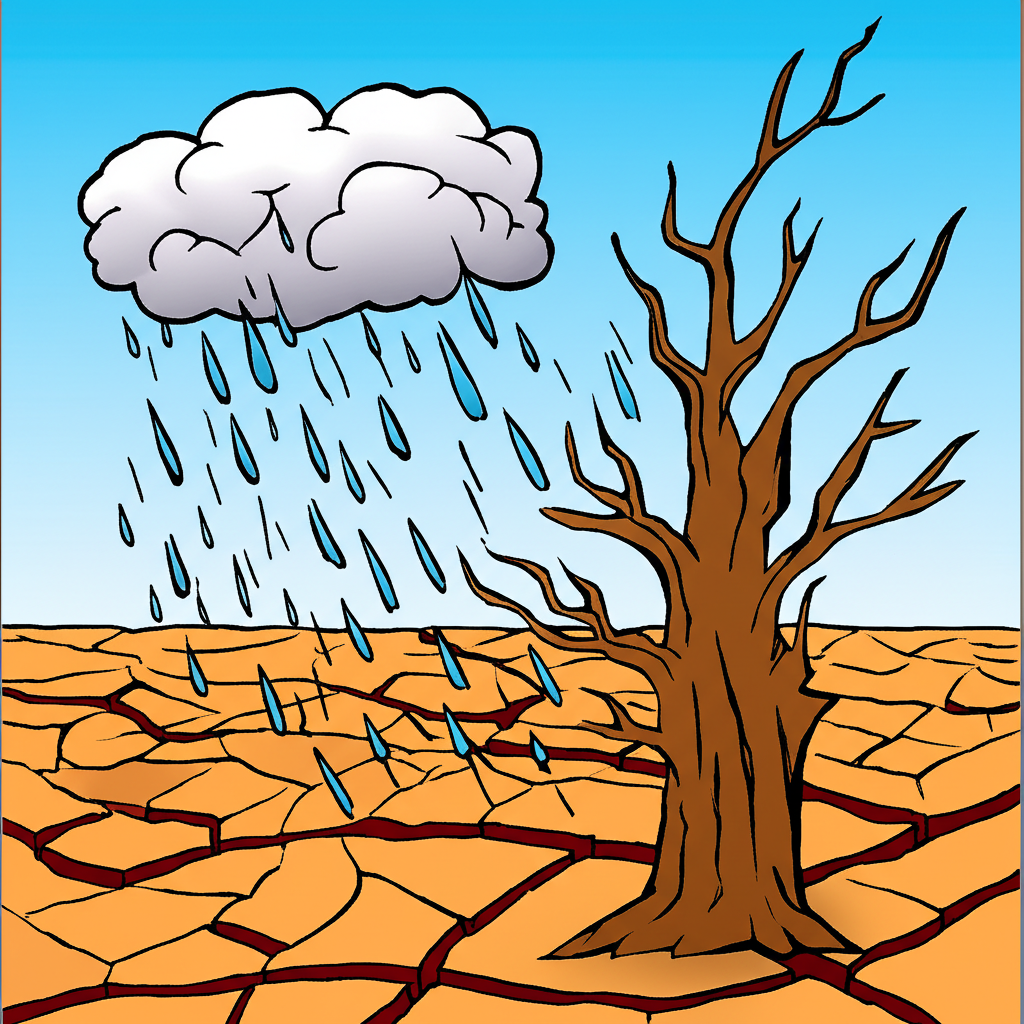
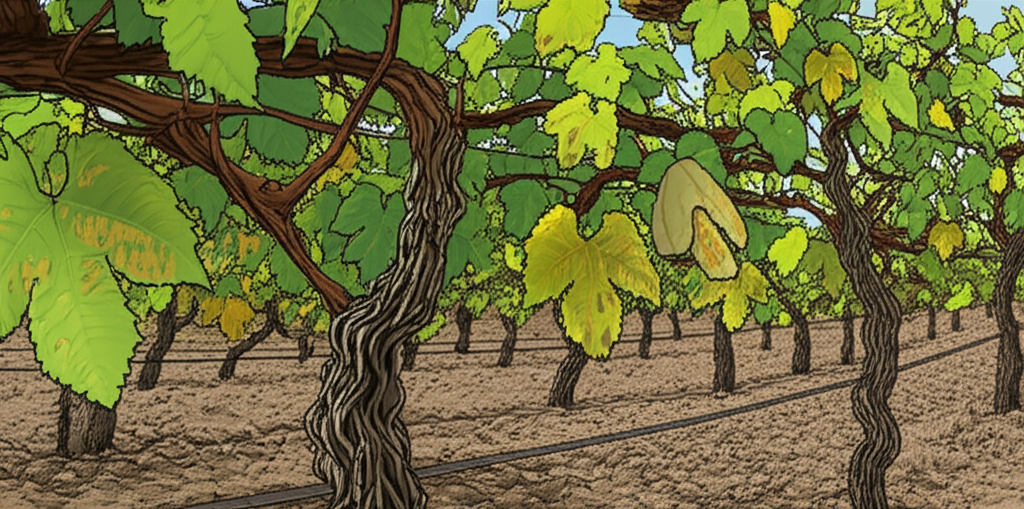
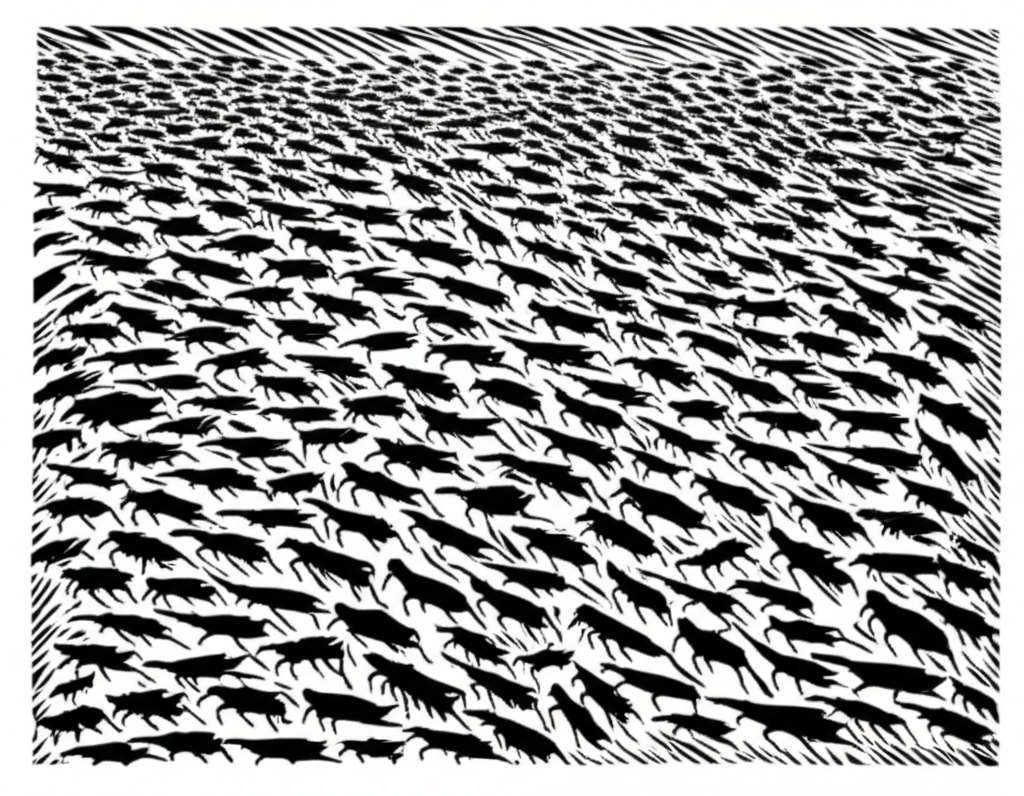
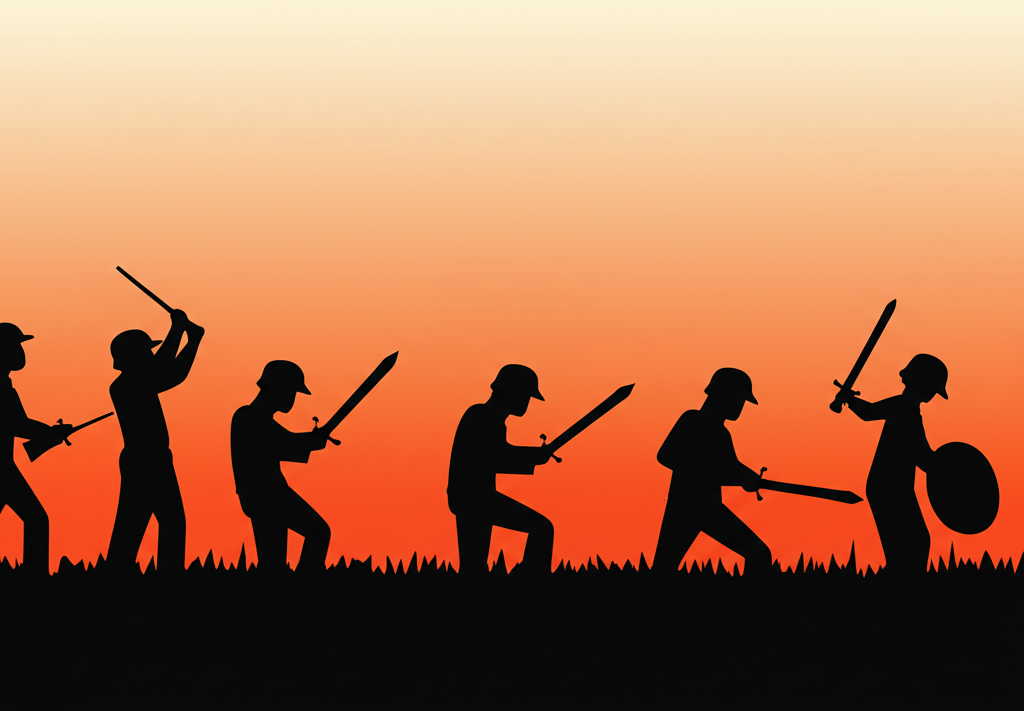

Amos chapter 4 kjv
- 1 Hear this word, ye kine of Bashan, that are in the mountain of Samaria, which oppress the poor, which crush the needy, which say to their masters, Bring, and let us drink.
- 2 The Lord GOD hath sworn by his holiness, that, lo, the days shall come upon you, that he will take you away with hooks, and your posterity with fishhooks.
- 3 And ye shall go out at the breaches, every cow at that which is before her; and ye shall cast them into the palace, saith the LORD.
- 4 Come to Bethel, and transgress; at Gilgal multiply transgression; and bring your sacrifices every morning, and your tithes after three years:
- 5 And offer a sacrifice of thanksgiving with leaven, and proclaim and publish the free offerings: for this liketh you, O ye children of Israel, saith the Lord GOD.
- 6 And I also have given you cleanness of teeth in all your cities, and want of bread in all your places: yet have ye not returned unto me, saith the LORD.
- 7 And also I have withholden the rain from you, when there were yet three months to the harvest: and I caused it to rain upon one city, and caused it not to rain upon another city: one piece was rained upon, and the piece whereupon it rained not withered.
- 8 So two or three cities wandered unto one city, to drink water; but they were not satisfied: yet have ye not returned unto me, saith the LORD.
- 9 I have smitten you with blasting and mildew: when your gardens and your vineyards and your fig trees and your olive trees increased, the palmerworm devoured them: yet have ye not returned unto me, saith the LORD.
- 10 I have sent among you the pestilence after the manner of Egypt: your young men have I slain with the sword, and have taken away your horses; and I have made the stink of your camps to come up unto your nostrils: yet have ye not returned unto me, saith the LORD.
- 11 I have overthrown some of you, as God overthrew Sodom and Gomorrah, and ye were as a firebrand plucked out of the burning: yet have ye not returned unto me, saith the LORD.
- 12 Therefore thus will I do unto thee, O Israel: and because I will do this unto thee, prepare to meet thy God, O Israel.
- 13 For, lo, he that formeth the mountains, and createth the wind, and declareth unto man what is his thought, that maketh the morning darkness, and treadeth upon the high places of the earth, The LORD, The God of hosts, is his name.
Amos chapter 4 nkjv
- 1 Hear this word, you cows of Bashan, who are on the mountain of Samaria, Who oppress the poor, Who crush the needy, Who say to your husbands, "Bring wine, let us drink!"
- 2 The Lord GOD has sworn by His holiness: "Behold, the days shall come upon you When He will take you away with fishhooks, And your posterity with fishhooks.
- 3 You will go out through broken walls, Each one straight ahead of her, And you will be cast into Harmon," Says the LORD.
- 4 "Come to Bethel and transgress, At Gilgal multiply transgression; Bring your sacrifices every morning, Your tithes every three days.
- 5 Offer a sacrifice of thanksgiving with leaven, Proclaim and announce the freewill offerings; For this you love, You children of Israel!" Says the Lord GOD.
- 6 "Also I gave you cleanness of teeth in all your cities, And lack of bread in all your places; Yet you have not returned to Me," Says the LORD.
- 7 "I also withheld rain from you, When there were still three months to the harvest. I made it rain on one city, I withheld rain from another city. One part was rained upon, And where it did not rain the part withered.
- 8 So two or three cities wandered to another city to drink water, But they were not satisfied; Yet you have not returned to Me," Says the LORD.
- 9 "I blasted you with blight and mildew. When your gardens increased, Your vineyards, Your fig trees, And your olive trees, The locust devoured them; Yet you have not returned to Me," Says the LORD.
- 10 "I sent among you a plague after the manner of Egypt; Your young men I killed with a sword, Along with your captive horses; I made the stench of your camps come up into your nostrils; Yet you have not returned to Me," Says the LORD.
- 11 "I overthrew some of you, As God overthrew Sodom and Gomorrah, And you were like a firebrand plucked from the burning; Yet you have not returned to Me," Says the LORD.
- 12 "Therefore thus will I do to you, O Israel; Because I will do this to you, Prepare to meet your God, O Israel!"
- 13 For behold, He who forms mountains, And creates the wind, Who declares to man what his thought is, And makes the morning darkness, Who treads the high places of the earth? The LORD God of hosts is His name.
Amos chapter 4 niv
- 1 Hear this word, you cows of Bashan on Mount Samaria, you women who oppress the poor and crush the needy and say to your husbands, "Bring us some drinks!"
- 2 The Sovereign LORD has sworn by his holiness: "The time will surely come when you will be taken away with hooks, the last of you with fishhooks.
- 3 You will each go straight out through breaches in the wall, and you will be cast out toward Harmon," declares the LORD.
- 4 "Go to Bethel and sin; go to Gilgal and sin yet more. Bring your sacrifices every morning, your tithes every three years.
- 5 Burn leavened bread as a thank offering and brag about your freewill offerings? boast about them, you Israelites, for this is what you love to do," declares the Sovereign LORD.
- 6 "I gave you empty stomachs in every city and lack of bread in every town, yet you have not returned to me," declares the LORD.
- 7 "I also withheld rain from you when the harvest was still three months away. I sent rain on one town, but withheld it from another. One field had rain; another had none and dried up.
- 8 People staggered from town to town for water but did not get enough to drink, yet you have not returned to me," declares the LORD.
- 9 "Many times I struck your gardens and vineyards, destroying them with blight and mildew. Locusts devoured your fig and olive trees, yet you have not returned to me," declares the LORD.
- 10 "I sent plagues among you as I did to Egypt. I killed your young men with the sword, along with your captured horses. I filled your nostrils with the stench of your camps, yet you have not returned to me," declares the LORD.
- 11 "I overthrew some of you as I overthrew Sodom and Gomorrah. You were like a burning stick snatched from the fire, yet you have not returned to me," declares the LORD.
- 12 "Therefore this is what I will do to you, Israel, and because I will do this to you, Israel, prepare to meet your God."
- 13 He who forms the mountains, who creates the wind, and who reveals his thoughts to mankind, who turns dawn to darkness, and treads on the heights of the earth? the LORD God Almighty is his name.
Amos chapter 4 esv
- 1 "Hear this word, you cows of Bashan, who are on the mountain of Samaria, who oppress the poor, who crush the needy, who say to your husbands, 'Bring, that we may drink!'
- 2 The Lord GOD has sworn by his holiness that, behold, the days are coming upon you, when they shall take you away with hooks, even the last of you with fishhooks.
- 3 And you shall go out through the breaches, each one straight ahead; and you shall be cast out into Harmon," declares the LORD.
- 4 "Come to Bethel, and transgress; to Gilgal, and multiply transgression; bring your sacrifices every morning, your tithes every three days;
- 5 offer a sacrifice of thanksgiving of that which is leavened, and proclaim freewill offerings, publish them; for so you love to do, O people of Israel!" declares the Lord GOD.
- 6 "I gave you cleanness of teeth in all your cities, and lack of bread in all your places, yet you did not return to me," declares the LORD.
- 7 "I also withheld the rain from you when there were yet three months to the harvest; I would send rain on one city, and send no rain on another city; one field would have rain, and the field on which it did not rain would wither;
- 8 so two or three cities would wander to another city to drink water, and would not be satisfied; yet you did not return to me," declares the LORD.
- 9 "I struck you with blight and mildew; your many gardens and your vineyards, your fig trees and your olive trees the locust devoured; yet you did not return to me," declares the LORD.
- 10 "I sent among you a pestilence after the manner of Egypt; I killed your young men with the sword, and carried away your horses, and I made the stench of your camp go up into your nostrils; yet you did not return to me," declares the LORD.
- 11 "I overthrew some of you, as when God overthrew Sodom and Gomorrah, and you were as a brand plucked out of the burning; yet you did not return to me," declares the LORD.
- 12 "Therefore thus I will do to you, O Israel; because I will do this to you, prepare to meet your God, O Israel!"
- 13 For behold, he who forms the mountains and creates the wind, and declares to man what is his thought, who makes the morning darkness, and treads on the heights of the earth ? the LORD, the God of hosts, is his name!
Amos chapter 4 nlt
- 1 Listen to me, you fat cows
living in Samaria,
you women who oppress the poor
and crush the needy,
and who are always calling to your husbands,
"Bring us another drink!" - 2 The Sovereign LORD has sworn this by his holiness:
"The time will come when you will be led away
with hooks in your noses.
Every last one of you will be dragged away
like a fish on a hook! - 3 You will be led out through the ruins of the wall;
you will be thrown from your fortresses, "
says the LORD. - 4 "Go ahead and offer sacrifices to the idols at Bethel.
Keep on disobeying at Gilgal.
Offer sacrifices each morning,
and bring your tithes every three days. - 5 Present your bread made with yeast
as an offering of thanksgiving.
Then give your extra voluntary offerings
so you can brag about it everywhere!
This is the kind of thing you Israelites love to do,"
says the Sovereign LORD. - 6 "I brought hunger to every city
and famine to every town.
But still you would not return to me,"
says the LORD. - 7 "I kept the rain from falling
when your crops needed it the most.
I sent rain on one town
but withheld it from another.
Rain fell on one field,
while another field withered away. - 8 People staggered from town to town looking for water,
but there was never enough.
But still you would not return to me,"
says the LORD. - 9 "I struck your farms and vineyards with blight and mildew.
Locusts devoured all your fig and olive trees.
But still you would not return to me,"
says the LORD. - 10 "I sent plagues on you
like the plagues I sent on Egypt long ago.
I killed your young men in war
and led all your horses away.
The stench of death filled the air!
But still you would not return to me,"
says the LORD. - 11 "I destroyed some of your cities,
as I destroyed Sodom and Gomorrah.
Those of you who survived
were like charred sticks pulled from a fire.
But still you would not return to me,"
says the LORD. - 12 "Therefore, I will bring upon you all the disasters I have announced.
Prepare to meet your God in judgment, you people of Israel!" - 13 For the LORD is the one who shaped the mountains,
stirs up the winds, and reveals his thoughts to mankind.
He turns the light of dawn into darkness
and treads on the heights of the earth.
The LORD God of Heaven's Armies is his name!
- Bible Book of Amos
- 1 Judgment on Israel's Neighbors
- 2 Judgment on Judah
- 3 Israel's Guilt and Punishment
- 4 Israel Has Not Returned to the Lord
- 5 Seek the Lord and Live
- 6 Woe to Those at Ease in Zion
- 7 Warning Visions
- 8 The Coming Day of Bitter Mourning
- 9 The Destruction of Israel